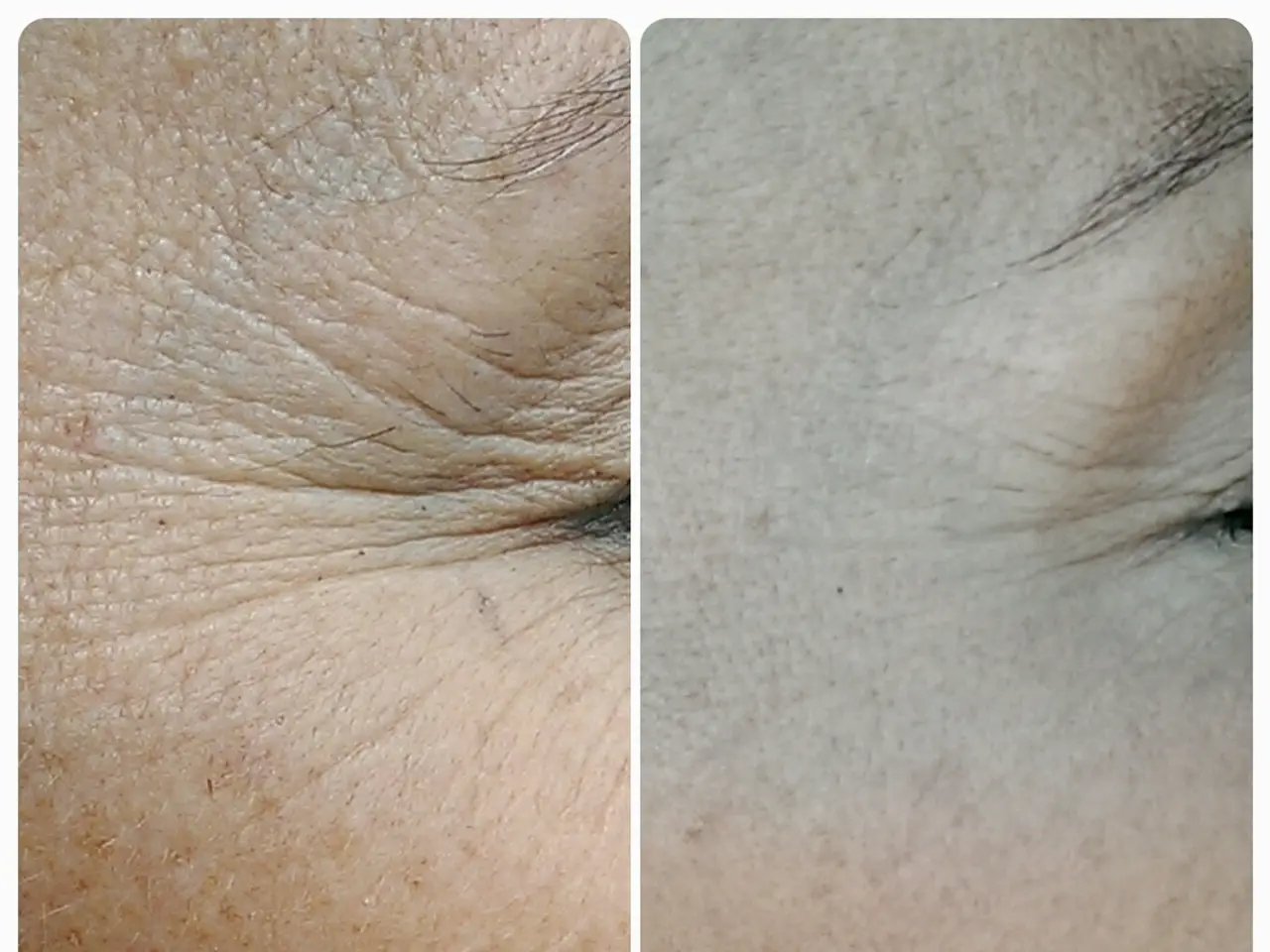Essential Guide for Hydrating Your Face: Discover the Best Moisturizers for a Radiant Complexion
Choosing the Right Moisturizer for Your Skin Type
Maintaining healthy, youthful-looking skin is all about finding the right moisturizer for your unique needs. Daytime and nighttime moisturizers are designed to meet your skin's specific needs during different times of the day. Day creams are lightweight and absorb quickly, while night creams are richer and more nourishing.
The best moisturizers vary by skin type to address specific hydration needs and texture preferences. Here's a guide to help you choose the perfect moisturizer for your skin type:
Oily Skin
Oily skin benefits from lightweight lotions or gel-based moisturizers. Avoid heavy creams and opt for gel textures that absorb quickly and reduce shine. Examples include Tower 28 SOS Recovery Cream, Neutrogena Hydro Boost Gel Cream, and Epionce Renewal Facial Lotion.
Dry Skin
For dry skin, thick lotions, creams, or ointments are recommended. These provide intense hydration with rich, emollient textures. Products with hyaluronic acid and ceramides are particularly beneficial. An example is Olehenriksen Après Skin Multi-Use Rich Rescue Creme.
Sensitive Skin
Sensitive skin requires fragrance-free, gentle formulations with soothing ingredients. Look for hypoallergenic, dermatologist-tested, non-irritating moisturizers free from parabens and fragrances. Hyaluronic acid and ceramides are helpful for sensitive skin too.
Combination Skin
Combination skin requires a balanced moisturizer that hydrates dry areas without overloading oily zones. Aim for medium consistency moisturizers that provide hydration without being too heavy. Examples include Neutrogena Hydro Boost Gel Cream and Clinique Moisture Surge™ 100H.
Common Ingredients in Moisturizers
Understanding common ingredients in moisturizers can help make better skincare choices. For instance, hyaluronic acid and ceramides are broadly recommended for all skin types because they hydrate and help repair the skin barrier without clogging pores. Glycerin is another vital humectant that helps maintain soft, supple skin by drawing moisture to it and locking it in. It is suitable for all skin types and creates a refreshed and smooth complexion.
Natural Alternatives
If you prefer natural alternatives to store-bought moisturizers, consider coconut oil, aloe vera gel, shea butter, honey, and jojoba oil. Use these ingredients sparingly and always perform a patch test first to avoid irritation.
Tips for Using Moisturizer
To get the most out of your moisturizer, follow these steps: cleanse your face, pat it dry gently, warm a small amount between your fingertips, massage it into your skin using upward strokes, allow it to absorb fully before applying sunscreen or treatments, and repeat the process twice daily.
When to Switch Moisturizers
If your skin does not improve or feels worse with a moisturizer, discontinue use and try a product better suited to your skin type. Signs of an unsuitable moisturizer include redness, irritation, breakouts, or a tight, uncomfortable feeling.
Special Considerations
For mature skin, moisturizers with ingredients like hyaluronic acid, niacinamide, and retinol (except during pregnancy or breastfeeding) can provide anti-aging benefits. Sensitive skin should opt for fragrance-free, hypoallergenic formulas with soothing ingredients like aloe vera, chamomile, or colloidal oatmeal.
Sun Protection
Moisturizers with SPF can provide daily sun protection, which is beneficial regardless of skin type but especially when looking to simplify routines.
Vitamin E
Vitamin E is a multi-tasking antioxidant that shields the skin from environmental stressors such as pollution and UV damage. It is known for its soothing and hydrating properties and is particularly beneficial for dry and sensitive skin.
Moisturizing Your Face
Moisturizing your face is essential for maintaining healthy, youthful-looking skin. Skipping moisturizer can lead to flaky, dull, or prematurely aging skin, and in some cases, trigger breakouts. Consistent moisturizing can help reduce fine lines, improve elasticity, and give the face a fresh, healthy glow.
Body Lotion vs. Facial Moisturizer
Body lotion is not ideal for the face because it is often thicker and contains fragrances or oils that may clog pores. Use facial moisturizers to avoid irritation and breakouts.
Choosing the Right Moisturizer
The choice of moisturizer depends on your skin’s needs for hydration, oil control, and sensitivity. Gel-based formulas typically preferred for oily skin, rich creams for dry skin, gentle fragrance-free options for sensitive skin, and balanced formulas for combination skin. For instance, the Supermello Gel Cream Moisturizer is a good option for sensitive skin, while products like the Super Rich Ceramide + Collagen Firming Cream can help replenish natural lipids in the skin and prevent dryness and irritation.
- For oily skin, lightweight gel-based moisturizers are beneficial, like the Tower 28 SOS Recovery Cream, Neutrogena Hydro Boost Gel Cream, and Epionce Renewal Facial Lotion.
- Dry skin requires thick lotions, creams, or ointments, as in the case of Olehenriksen Après Skin Multi-Use Rich Rescue Creme.
- Sensitive skin calls for fragrance-free, gentle formulations, such as those with hyaluronic acid and ceramides.
- Combination skin requires a balanced moisturizer with medium consistency, like Neutrogena Hydro Boost Gel Cream and Clinique Moisture Surge™ 100H.
- Hyaluronic acid and ceramides, common ingredients in moisturizers, help provide hydration and aid in skin barrier repair without clogging pores.
- Natural alternatives to store-bought moisturizers include coconut oil, aloe vera gel, shea butter, honey, and jojoba oil, but use sparingly and perform a patch test first.
- To maximize the benefits of your moisturizer, follow a skincare routine that includes cleansing, massaging the moisturizer into your skin, and allowing it to absorb fully before applying sunscreen or treatments.
- For mature skin, moisturizers containing hyaluronic acid, niacinamide, and retinol can offer anti-aging benefits, while sensitive skin should opt for fragrance-free, hypoallergenic options with soothing ingredients.




